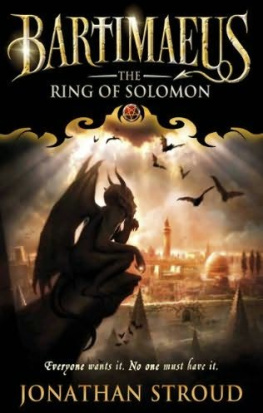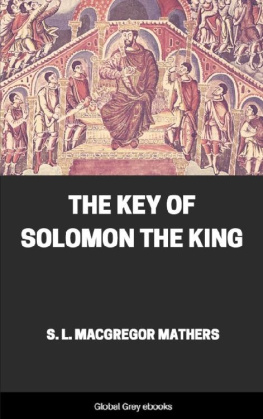Jonathan Stroud - Bartimaeus: The Ring of Solomon
Here you can read online Jonathan Stroud - Bartimaeus: The Ring of Solomon full text of the book (entire story) in english for free. Download pdf and epub, get meaning, cover and reviews about this ebook. year: 2010, publisher: Doubleday Childrens, genre: Detective and thriller. Description of the work, (preface) as well as reviews are available. Best literature library LitArk.com created for fans of good reading and offers a wide selection of genres:
Romance novel
Science fiction
Adventure
Detective
Science
History
Home and family
Prose
Art
Politics
Computer
Non-fiction
Religion
Business
Children
Humor
Choose a favorite category and find really read worthwhile books. Enjoy immersion in the world of imagination, feel the emotions of the characters or learn something new for yourself, make an fascinating discovery.
- Book:Bartimaeus: The Ring of Solomon
- Author:
- Publisher:Doubleday Childrens
- Genre:
- Year:2010
- Rating:3 / 5
- Favourites:Add to favourites
- Your mark:
- 60
- 1
- 2
- 3
- 4
- 5
Bartimaeus: The Ring of Solomon: summary, description and annotation
We offer to read an annotation, description, summary or preface (depends on what the author of the book "Bartimaeus: The Ring of Solomon" wrote himself). If you haven't found the necessary information about the book — write in the comments, we will try to find it.
Bartimaeus: The Ring of Solomon — read online for free the complete book (whole text) full work
Below is the text of the book, divided by pages. System saving the place of the last page read, allows you to conveniently read the book "Bartimaeus: The Ring of Solomon" online for free, without having to search again every time where you left off. Put a bookmark, and you can go to the page where you finished reading at any time.
Font size:
Interval:
Bookmark:

JONATHAN STROUD
DOUBLEDAY
This eBook is copyright material and must not be copied, reproduced, transferred, distributed, leased, licensed or publicly performed or used in any way except as specifically permitted in writing by the publishers, as allowed under the terms and conditions under which it was purchased or as strictly permitted by applicable copyright law. Any unauthorised distribution or use of this text may be a direct infringement of the authors and publishers rights and those responsible may be liable in law accordingly.
Version 1.0
Epub ISBN 9781407076898
www.randomhouse.co.uk
THE RING OF SOLOMON
A DOUBLEDAY BOOK
Hardback 978 0 385 61915 8
Trade paperback 978 0 385 61916 5
Published in Great Britain by Doubleday,
an imprint of Random House Childrens Books
A Random House Group Company
This edition published 2010
1 3 5 7 9 10 8 6 4 2
Copyright Jonathan Stroud, 2010
Map illustration copyright Kayley LeFaiver, 2010
The right of Jonathan Stroud to be identified as the author of this work has been asserted in accordance with the Copyright, Designs and Patents Act 1988.
All rights reserved. No part of this publication may be reproduced, stored in a retrieval system, or transmitted in any form or by any means, electronic, mechanical, photocopying, recording or otherwise, without the prior permission of the publishers.
The Random House Group Limited supports the Forest Stewardship Council (FSC), the leading international forest certification organization. All our titles that are printed on Greenpeace-approved FSC-certified paper carry the FSC logo. Our paper procurement policy can be found at www.rbooks.co.uk/environment.

Set in 12 on 15 point Bembo
RANDOM HOUSE CHILDRENS BOOKS 6163 Uxbridge Road, London W5 5SA
www.kidsatrandomhouse.co.uk
www.rbooks.co.uk
Addresses for companies within The Random House Group Limited can be found at: www.randomhouse.co.uk/offices.htm
THE RANDOM HOUSE GROUP Limited Reg. No. 954009
A CIP catalogue record for this book is available from the British Library.
Printed and bound in Great Britain by Clays Ltd, St Ives plc
For Arthur,
with love
Also by Jonathan Stroud
Bartimaeus
The Amulet of Samarkand
The Golems Eye
Ptolemys Gate
Buried Fire
The Leap
The Last Siege
Heroes of the Valley
www.jonathanstroud.com
Since history began in the mud-brick cities of Mesopotamia more than five thousand years ago, rulers of great nations have always used magicians to help maintain their rule. The pharaohs of Egypt and the kings of Sumer, Assyria and Babylon all relied on magic to protect their cities, strengthen their armies and cast their enemies down. Modern governments, though cloaking the fact behind careful propaganda, continue this same policy.
Magicians do not have magical abilities themselves, but derive their power from the control of spirits, which do. They spend many years in lonely study, mastering the techniques that will allow them to summon these fearsome entities and survive. Successful magicians are consequently always clever and physically robust. Because of the dangers of their craft, they are also usually ruthless, secretive and self-serving.
For most summonings, the magician stands inside a carefully drawn circle of protection, within which is a pentacle, or five-sided star. Certain complex incantations are spoken, and the spirit is drawn from its far dimension. Next, the magician recites special words of Binding. If this is done correctly, the spirit becomes the magicians slave. If a mistake is made, the protective power of the circle is broken, and the unhappy magician is at the spirits mercy.
Once a slave is bound, it must obey its masters instructions until its task is complete. When this time comes (it may take hours, days or years), the rejoicing spirit is formally dismissed. In general, spirits resent their captivity, no matter what its duration, and seek any opportunity to do their masters harm. Most sensible magicians therefore keep their slaves for as short a time as possible, just in case their luck runs out.
All spirits are formed of essence, a fluid, ever-shifting substance. In their own dimension, known as the Other Place, they have no solid form, but on Earth they must take some kind of definite guise. However, higher spirits are able to change shape at will: this gives them some respite from the pain that Earths cruel solidity causes to their essence.
There are five main categories of spirit. These are:
1. Imps: The lowliest type. Imps are scurrilous and impertinent and their magic is humble. Most cannot change shape at all. Nevertheless they are easily directed and present no great danger to the magician. For this reason they are frequently summoned, and used for minor tasks such as scrubbing floors, clearing middens, carrying messages and keeping watch.
2. Foliots: More potent than imps, but not as dangerous as djinn, foliots are favoured by magicians for their stealth and cunning. Being reasonably adept at changing shape, they make excellent spies.
3. Djinn: The largest class of spirit, and the hardest to summarize. No two seem alike. They lack the raw power of the greatest spirits, but frequently exceed them in cleverness and audacity. They excel at shape-shifting, and have a vast arsenal of spells at their disposal. A djinni is the favoured slave for most competent magicians.
4. Afrits: Strong as bulls, imposing in stature and arrogant as kings, afrits are blunt and irascible by temperament. They are less subtle than other spirits, and their might frequently exceeds their intelligence. Monarchs throughout history have used them as vanguards in battle, and as guardians of their gold.
5. Marids: The most perilous and least common of the five types. Supremely confident in their magical power, marids sometimes appear in discreet or gentle guises, only to suddenly switch to vast and hideous shapes. Only the greatest magicians dare summon them.
All magicians fear their spirit-slaves, and ensure their obedience by means of inventive punishments. For this reason most spirits bow to the inevitable. They serve their masters as efficiently as possible and despite their natural instincts remain outwardly zealous and polite, for fear of repercussions.
This is what most spirits do. There are exceptions.
A note on pronunciation:
Djinni is pronounced jinnee,
and djinn is pronounced jinn.
Bartimaeus is pronounced Bart-im-ay-us.
Solomon | King of Israel |
Hiram | Solomons vizier |
Khaba | A magician in service to King Solomon |
Ezekiel | A magician in service to King Solomon |
And various other magicians, servants and wives
Balkis | Queen of Sheba |
Font size:
Interval:
Bookmark:
Similar books «Bartimaeus: The Ring of Solomon»
Look at similar books to Bartimaeus: The Ring of Solomon. We have selected literature similar in name and meaning in the hope of providing readers with more options to find new, interesting, not yet read works.
Discussion, reviews of the book Bartimaeus: The Ring of Solomon and just readers' own opinions. Leave your comments, write what you think about the work, its meaning or the main characters. Specify what exactly you liked and what you didn't like, and why you think so.









